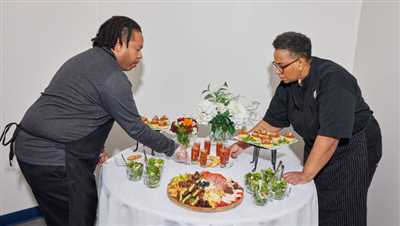
If you want to start a catering business, there are some things you need to know. Catering is a fast-paced industry that requires careful planning and attention to detail. However, with the right planning and organization, you can easily make your catering business a success.
One of the first things you need to do is create a business plan. This will help you outline your goals, target market, and determine what types of events you want to cater. It also helps you establish relationships with vendors and suppliers, manage your inventory and kitchen supplies, and set a budget.
Having the right equipment is also essential to running a catering business. You will need to invest in catering equipment such as food warmers, serving dishes, and utensils. Additionally, having the right technology can also help you better manage your business. There are some catering software options available that can help you with inventory management, menu planning, and even marketing your business.
Once you have everything in place, it’s time to get the necessary permits and licensing. You will also need to make sure you have insurance to cover any accidents or damages that may occur during an event. This is important for both you and your clients.
Marketing your business is another important aspect of starting a catering business. You can use social media to promote your services and build relationships with potential clients. You can also reach out to local event planners and offer your services as a preferred caterer.
When it comes to the actual catering, always strive for quality. Test out new recipes and make sure your food is of the highest standard. You can also offer different menu options to cater to different tastes and dietary restrictions.
Finally, being organized and having good time management skills are crucial in the catering industry. You need to be able to juggle multiple events at once and ensure that everything runs smoothly. Having a dedicated team to help you with the catering side of the business can also make a big difference.
In conclusion, starting a catering business can be challenging, but with the right planning and organization, you can make it a success. Take the time to learn about the industry, stock up on supplies, and use technology to your advantage. With hard work and dedication, you can establish yourself as a top caterer in your local area.
- Starting a Catering Business: How to Start a Catering Firm
- 1. Business Planning
- 2. Work Experience and Skills
- 3. Licensing and Permits
- 4. Types of Catering
- 5. Creating a Menu
- 6. Establish Relationships with Vendors
- 7. Event Planning and Management
- 8. Technology and Systems
- 9. Liability and Insurance
- 10. Marketing and Networking
- How to Start a Catering Business From Home 8 Steps
- 8 Choose Your Catering Type
- 7 Learn About Permits and Licensing
- 6 Set Up Your Business
- 5 Learn About Liability Insurance
- 4 Write Your Business Plan
- 3 Make a Marketing Plan
- 2 Create Your Menu
- 1 Buy Supplies and Equipment
- Establish Relations with Vendors
- Test the waters by working in the industry
- Work for a local caterer
- Volunteer as an event planner
- Videos:
- How Singapore Airlines Makes 50,000 In-Flight Meals A Day | Big Business | Insider Business
Starting a Catering Business: How to Start a Catering Firm
Are you passionate about food and dream of starting your own catering firm? Catering is a lucrative business that requires careful planning and hard work. In this guide, we will walk you through the steps to help you start your own successful catering business.
1. Business Planning
The first step in starting a catering firm is to create a comprehensive business plan. This plan will serve as your roadmap and will include details such as your target market, financial projections, marketing strategies, and more. A well-thought-out business plan will set the foundation for your catering business.
2. Work Experience and Skills
To excel in the catering industry, it is crucial to have prior work experience in the food service or hospitality industry. Working in a professional kitchen or for an established catering company will give you valuable insight into the operations and intricacies of the business.
3. Licensing and Permits
Before you can start catering for events, you need to obtain the necessary licenses and permits. These may include a food service license, liquor license (if you plan to serve alcohol), and health department permits. Make sure to research the specific requirements in your area and ensure compliance.
4. Types of Catering
There are various types of catering businesses you can choose from, such as corporate catering, wedding catering, and social event catering. Decide on the type of catering you want to specialize in based on your interests, skills, and market demand.
5. Creating a Menu
A crucial aspect of starting a catering business is creating a menu that showcases your culinary expertise and caters to your target audience. Consider dietary restrictions, seasonal offerings, and popular food trends to create a menu that will impress your clients.
6. Establish Relationships with Vendors

In the catering industry, establishing relationships with reliable vendors is essential. Find trusted suppliers for fresh produce, meats, beverages, and other ingredients. Building strong relationships with vendors ensures that you have the highest quality ingredients for your dishes.
7. Event Planning and Management
As a caterer, you must be skilled in event planning and management. You will be responsible for everything from coordinating with clients and venues to organizing logistics and ensuring a smooth execution of the event.
8. Technology and Systems
Embrace technology to streamline your catering operations. Invest in catering management software that can help you with tasks such as event scheduling, menu planning, inventory management, and client communication. Utilizing technology can save you time and money in the long run.
9. Liability and Insurance
A catering business carries potential risks and liabilities. Protect yourself and your firm by obtaining liability insurance and proper coverage for your equipment and employees. It is essential to have the necessary insurance in place to safeguard your business in case of any unforeseen incidents.
10. Marketing and Networking
Once your catering firm is up and running, marketing and networking are crucial to attract clients. Utilize social media platforms, create a professional website, attend industry events, and collaborate with other event professionals. Creating a strong online presence and establishing a network within the industry will help you grow your client base.
Starting a catering firm requires hard work, dedication, and a passion for creating memorable culinary experiences. By following these steps and continuously improving your skills, you can turn your passion for food into a successful catering business.
How to Start a Catering Business From Home 8 Steps
Starting a catering business from home can be a rewarding venture for those who are passionate about food and have a knack for managing events. Whether you want to cater small personal occasions or large corporate events, the catering industry offers a wide range of opportunities. However, starting a catering business requires careful planning and organization to ensure success. In this guide, we will cover eight essential steps to help you get started in the catering business from home.
- Step 1: Create a Business Plan
- Start by outlining your business goals, target market, and the type of catering services you want to offer.
- Define your menu options and pricing strategy to attract clients and ensure profitability.
- Identify potential competitors and analyze their strengths and weaknesses to give yourself a competitive edge.
- Step 2: Obtain Necessary Licensing and Permits
- Research the local licensing and permit requirements for starting a catering business from home.
- Obtain the necessary permits and licenses to ensure that your business operates legally.
- Consider getting liability insurance to protect yourself and your clients in case of any unforeseen incidents.
- Step 3: Set Up Your Kitchen and Equipment
- Designate a specific area in your home as your catering kitchen.
- Invest in the right equipment and supplies to prepare and serve food efficiently.
- Ensure that your kitchen meets the required health and safety standards.
- Step 4: Source Quality Ingredients and Vendors
- Find reliable vendors who can supply you with fresh and high-quality ingredients.
- Build good relationships with your vendors to ensure timely delivery and better pricing.
- Test different ingredients and suppliers to create a menu that stands out.
- Step 5: Market Your Catering Business
- Develop a comprehensive marketing plan to promote your catering services.
- Utilize various marketing channels such as social media, online advertising, and local publications.
- Showcase your menu, testimonials, and past events to attract potential clients.
- Step 6: Work on Managing Orders and Client Relations
- Implement a system to efficiently manage orders, contracts, and payments.
- Provide exceptional customer service to build strong relationships with your clients.
- Regularly communicate with clients to ensure their satisfaction and address any concerns.
- Step 7: Learn From the Industry and Keep Improving
- Stay updated with the latest trends and developments in the catering industry.
- Attend industry events, workshops, and conferences to learn from experienced caterers.
- Continuously improve your skills, offerings, and operations to stay ahead of the competition.
- Step 8: Save Time and Money by Outsourcing or Automating
- Consider outsourcing certain tasks such as bookkeeping or event setup to save time.
- Use technology tools and software to streamline your operations and improve efficiency.
- Regularly evaluate your expenses and find ways to cut costs without compromising quality.
By following these eight steps, you can start a successful catering business from home and turn your passion for food into a profitable venture. Remember to always prioritize quality, professionalism, and customer satisfaction to keep your clients coming back for more.
8 Choose Your Catering Type
When it comes to starting a catering business, there are many options to choose from. It’s important to find the catering type that best aligns with your skills, interests, and target market. Here are some factors to consider when making your decision:
- Corporate Catering: If you prefer working with large companies and providing food for events like conferences, meetings, and corporate parties, then corporate catering may be the right choice for you. This type of catering typically requires a well-organized business planner, as it often involves working with tight deadlines and large guest lists. It’s also important to have a diverse menu to cover different dietary preferences.
- Wedding Catering: Wedding catering is an essential part of the wedding planning process. This type of catering involves creating menus that cater to the specific tastes and preferences of the bride, groom, and their guests. It’s also important to have strong event planning skills, as weddings require meticulous attention to detail and coordinating with multiple vendors.
- Personal Chef Catering: If you enjoy cooking personalized meals and providing a more intimate dining experience, personal chef catering might be the perfect fit for you. This type of catering involves working directly with clients to create customized menus and meals in their homes. It requires strong culinary skills and the ability to work one-on-one with clients to meet their specific needs.
- Food Truck Catering: Food trucks have gained significant popularity in the catering industry. They offer the flexibility of moving from one location to another and can cater to various events such as festivals, fairs, and weddings. Food truck catering requires a creative menu and excellent time management skills to serve customers quickly and efficiently.
- Home-Based Catering: Starting a home-based catering business allows you to save on the cost of renting a commercial kitchen or space. However, you will still need to obtain the necessary permits and licensing to operate legally from your home. Home-based catering is a great option if you want to have more control over your working hours and have a smaller-scale business.
- Event Catering: Event catering offers a wide range of opportunities, from small private parties to large-scale corporate events and everything in between. It’s important to be well-prepared when catering events, as they often require a significant inventory of food, equipment, and staff. Event catering can be a fast-paced and demanding type of catering, but it can also be highly rewarding.
- Buffet Catering: Buffet catering is a popular choice for many occasions. It offers a wide variety of food options and allows guests to serve themselves at their own pace. Buffet catering requires careful menu planning to accommodate different dietary restrictions and preferences. It’s also crucial to provide exceptional customer service and ensure that the buffet area is well-maintained throughout the event.
- Social Catering: Social catering covers a range of occasions, from birthday parties to holiday gatherings and family reunions. This type of catering often requires a more personalized approach, as clients may have specific requests or themes for their events. Social catering can be a great opportunity to showcase your creativity and make a positive impact on people’s special occasions.
Take the time to research each catering type and identify which one aligns with your skills, interests, and goals. Remember that the catering industry is always evolving, and there are opportunities to learn and incorporate new technology and trends into your business. Choose the catering type that not only suits your current capabilities but also provides room for growth and success in the future.
7 Learn About Permits and Licensing
When starting a catering business, it’s important to understand the permits and licensing required to operate legally. This step is crucial as it ensures you comply with local regulations and avoids any unnecessary penalties or legal issues down the line.
The type of permits and licenses you need will depend on various factors, including the location of your kitchen, the types of events you plan to cater, and the sources of food and ingredients you use.
First, you may need to obtain a food handler’s permit or certificate. This ensures you have the necessary knowledge and skills to handle and prepare food safely. Some regions even require specific certifications for catering businesses, so make sure to check with your local health department to find out the exact requirements.
In addition to food-related permits, you may also need to obtain a business license or permit, which allows you to legally operate your catering business. This license might include specific provisions for catering services, so it’s essential to have everything in writing and ensure you have the right permissions to cater events.
Depending on your location and the types of events you cater, you may also need to consider liability insurance coverage. This helps protect you and your business from any potential accidents or damages that may occur during an event. Insurance gives your clients peace of mind and lets them know you are a professional who takes their responsibilities seriously.
Furthermore, if you plan to serve alcohol at any of your events, you may need to obtain a separate liquor license. This allows you to serve alcoholic beverages legally while adhering to the local regulations surrounding sales and consumption of alcohol.
When getting started, it’s always a good idea to have a comprehensive business plan that covers all aspects of your catering business, including permits and licensing. This plan will not only serve as a guide but also help you make informed decisions as you move ahead.
Take the time to research and understand the specific permits and licenses required for catering businesses in your area. Reach out to local authorities, industry experts, or even established caterers for advice and guidance. Being proactive and knowledgeable about permits and licensing shows that you are serious about running a professional and legal catering business.
Remember, permits and licensing are just some of the many important factors to consider when starting a catering business. Work on building positive relationships with local vendors, managing your inventory, and honing your culinary skills to make your business stand out. Delivering exceptional service and creating delicious menus will help you gain a loyal client base and propel your catering business to success.
6 Set Up Your Business
Once you have a clear plan in place and have done the necessary research and preparation, it’s time to start setting up your catering business. Here are the key steps to get your business up and running:
1. Licensing and Permits: Make sure you obtain all the required licenses and permits to legally operate your catering business. This includes business permits, health permits, and any other permits that may be specific to your local area.
2. Create a Business Plan: Write a comprehensive business plan that outlines your mission, objectives, target market, menu types, pricing, and marketing strategies. A well-written business plan will help you stay focused and attract investors if needed.
3. Insurance: Protect your business by getting the right types of insurance coverage. This may include general liability insurance, property insurance, and possibly workers’ compensation insurance if you plan on hiring employees.
4. Establish Your Catering Firm: Decide on the legal structure of your business. You can choose to start as a sole proprietorship, a limited liability company (LLC), or a corporation. Consult with a lawyer or a business advisor to determine which type of legal structure is best for you.
5. Set Up Your Kitchen: Get the necessary equipment and supplies to set up a functional and efficient kitchen. This includes ovens, refrigerators, cooking utensils, serving dishes, and more. Make sure to test and maintain all equipment regularly to ensure everything is in working order.
6. Menu Creation: Work with your chef or caterer to create a diverse and appealing menu that caters to the preferences of your target market. Include a variety of dishes, accommodating different dietary needs and preferences.
7. Stock Up on Inventory: Create a list of everything you will need to stock your kitchen and cater events. This includes both perishable and non-perishable items. Establish relationships with vendors to ensure a steady supply of quality ingredients and products.
8. Client Relations: Always prioritize excellent client relations. Make sure to listen to your clients’ needs and preferences, promptly respond to inquiries, and exceed expectations whenever possible. Word-of-mouth recommendations are invaluable in the catering business, so make sure to provide exceptional service.
By following these steps, you can set your catering business up for success and get started on the right side. Remember, starting a catering business takes time, effort, and careful planning, but with the right marketing and dedication, you can make your business thrive!
5 Learn About Liability Insurance
When starting a catering business, it is important to manage your liabilities and protect yourself financially. This is where liability insurance comes into play. Liability insurance helps caterers mitigate the risks associated with their business operations.
Here are some steps to help you learn about liability insurance and make the right choices for your catering business:
1. Understand the Types of Liability Insurance:
There are different types of liability insurance policies available for catering businesses. Make sure to research and choose the one that best suits your needs. Some common types include general liability insurance, product liability insurance, and professional liability insurance.
2. Know Your Liability as a Caterer:
As a caterer, you need to be aware of the potential risks and liabilities involved in your daily operations. This includes accidents or injuries that may occur at events, food-related issues, and property damage. Liability insurance helps protect you from these risks.
3. Work with an Insurance Firm:
To ensure you have the right coverage, it is important to work with a reputable insurance firm that specializes in the catering industry. They can help you understand the coverage options and provide personalized recommendations based on your specific needs.
4. Include Liability Insurance in Your Business Plan:
When starting a catering business, it is essential to have a comprehensive business plan. Make sure to include liability insurance in your plan to address potential risks and protect yourself financially.
5. Manage Your Costs:
Liability insurance can be a significant expense for catering businesses, especially when just starting out. However, it is always better to have insurance coverage to protect yourself and your business. Research different insurance providers, compare quotes, and choose the option that offers the best coverage at a cost-effective price.
In conclusion, liability insurance is crucial for any catering business. It helps caterers navigate the risks and potential liabilities associated with their operations. By learning about and choosing the right insurance coverage, you can ensure the smooth running of your catering business and focus on delivering exceptional service to your clients.
4 Write Your Business Plan
Writing a business plan is a crucial step in establishing your catering business. It helps you organize your thoughts, set goals, and create a roadmap for success. Here are some key steps to consider when writing your business plan:
1. Define Your Business
Clearly define the type of catering business you want to establish. Will you be working from a commercial kitchen or from your own home? Will you focus on a specific type of cuisine or cater to a variety of events and occasions? Having a clear vision of your business is essential for effective planning.
2. Conduct Market Research
Research the catering industry to understand the current market trends, competition, and customer preferences. Identify your target audience and determine your unique selling points to better position your business in the market.
3. Set Your Financial Plans
Determine the cost of starting and running your catering business. Consider factors such as equipment, inventory, licensing, insurance, marketing, and managing overhead. Create a comprehensive financial plan that covers both the initial investment and ongoing expenses.
4. Create a Menu
Choose the types of food you will offer on your catering menu. Test and refine the recipes to ensure they meet your standards and appeal to your target audience. Consider incorporating local and seasonal ingredients to provide a better dining experience.
5. Establish Relationships
Build relationships with local suppliers, vendors, and farmers to source the best ingredients for your dishes. Establish partnerships with event planners, wedding venues, and corporate firms to secure regular catering orders. Networking and good industry relations can help you grow your catering business.
6. Manage Your Liabilities
Ensure that you have the right insurance coverage to protect your catering business from any unforeseen events or accidents. Liability insurance is crucial to cover any potential claims from clients or guests. Consult with a personal insurance planner to make sure you have adequate coverage.
7. Volunteer and Give Back
Consider giving back to your community by volunteering your catering services for local charitable events. This not only helps you establish a positive reputation but also allows you to showcase your skills and attract potential clients. Giving back is a great way to contribute to society and build your catering business.
By following these steps and writing a well-thought-out business plan, you can set yourself up for success in the catering industry. Plan ahead, cover all the essential aspects, and make sure to adapt as the industry and your business evolve. Good luck!
3 Make a Marketing Plan
When starting a catering business, it’s crucial to have a well-thought-out marketing plan in place. This will help you stand out from the competition and attract clients to your services. Here are some key steps to consider:
- Identify your target audience: Determine the type of clients you want to cater to, such as corporate events, weddings, or private parties. Knowing your target audience will allow you to tailor your marketing efforts to the right people.
- Research the market: Take some time to learn about the catering industry in your local area. Find out who your competitors are, what services they offer, and what sets you apart from them. This information will help you position yourself effectively in the market.
- Create a marketing strategy: Develop a comprehensive plan that outlines the marketing activities you will use to promote your catering business. This may include advertising in local newspapers or magazines, using social media platforms to reach a larger audience, attending networking events, or investing in online advertising.
- Write a compelling menu: Your menu plays a crucial role in attracting clients. Make sure it showcases your culinary expertise and includes a variety of options that cater to different tastes and dietary preferences. Consider having a few signature dishes that set you apart from your competitors.
- Build positive client relations: Word-of-mouth is a powerful marketing tool in the catering industry. Aim to provide exceptional service and create a positive experience for your clients. Offer personalized attention, respond promptly to requests, and go the extra mile to exceed expectations.
- Test and refine: As you start taking orders and catering events, pay attention to feedback and customer satisfaction. Use this information to constantly improve your services and offerings.
- Utilize technology: Embrace technology to streamline your operations and enhance customer experience. Consider investing in catering management software that helps with planning, inventory management, and order processing.
- Get involved in the community: Volunteer your services for local events or donate food to charitable organizations. This not only helps you give back but also gets your name out there and builds a positive reputation.
- Manage your finances: Keep a close eye on your business costs and revenue. This includes accounting for the cost of ingredients, staff wages, transportation, equipment, insurance, and other overheads. Ensure you have liability insurance to protect yourself and your clients.
- Choose the right equipment: Invest in high-quality catering equipment that suits your business needs and can handle the demands of different events. Having reliable equipment will save you time and money in the long run.
By following these steps and creating a comprehensive marketing plan, you can effectively promote your catering business and increase your chances of success in the industry.
2 Create Your Menu
Once you have your catering business up and running, it’s time to focus on creating an enticing menu that will attract clients and keep them coming back for more. Your menu is one of the most important aspects of your business, as it showcases the type of food you offer and sets the tone for the overall dining experience.
To create an appealing menu, follow these steps:
- Know your target market: Before you start planning your menu, it’s crucial to understand your target market and the type of cuisine they prefer. Consider the demographics, preferences, and dietary restrictions of your clientele.
- Plan your offerings: Create a variety of menu options that cater to different tastes and preferences. Incorporate popular dishes, as well as unique and innovative options that set you apart from your competitors.
- Source quality ingredients: Always strive to use fresh and high-quality ingredients in your dishes. Find reliable vendors and establish good relationships with them to ensure a steady supply of ingredients.
- Consider dietary preferences: Take into account dietary preferences and restrictions, such as vegetarian, vegan, gluten-free, or allergen-friendly options. This will expand your client base and show that you cater to diverse needs.
- Create a balanced menu: Offer a balanced selection of appetizers, main courses, side dishes, and desserts. Consider the flow of flavors and textures to create a satisfying and cohesive dining experience.
- Stay ahead of industry trends: Keep yourself updated on the latest food trends and incorporate them into your menu. This shows that you are a forward-thinking caterer who is always striving to offer the best to your clients.
- Test your menu: Once you have created your menu, test it with a focus group or sample it at events. Gather feedback and make any necessary adjustments to ensure that it meets the expectations of your clients.
- Give your menu an enticing presentation: Present your menu in an appealing and professional manner. Use high-quality photographs, creative descriptions, and an attractive layout to entice your clients.
- Cover yourself with liability insurance: It’s important to have liability insurance to protect yourself and your business in case of any untoward incidents. Consult with an insurance firm that specializes in catering industry coverage.
- Use technology to your advantage: Embrace technology to streamline your menu planning process. Utilize inventory management software, online ordering systems, and digital marketing tools to make your operations more efficient.
By following these steps, you can create a menu that not only pleases your clients but also reflects your expertise and passion for the catering business. A well-designed and thoughtfully curated menu can be a powerful marketing tool that helps you attract new clients and retain existing ones.
1 Buy Supplies and Equipment
When starting a catering business, one of the first steps is to buy the necessary supplies and equipment. This will include everything from kitchen utensils and appliances to serving dishes and tableware. It’s important to have a well-stocked inventory to ensure that you have everything you need to cater to different types of events and occasions.
Here are some things to consider when buying supplies and equipment for your catering business:
- Make a list of the essential supplies: Before you start shopping, make a list of the essential supplies and equipment that you will need. This includes things like pots and pans, baking sheets, knives, utensils, serving trays, and more.
- Do some research: It’s always better to research before making any purchases. Look for the best deals and compare prices from different vendors. This helps you to save money and get the best quality supplies and equipment for your business.
- Consider the types of events you will be catering: Depending on the type of events you plan to cater, you may need specific supplies and equipment. For example, if you’re catering weddings, you may need special serving dishes and cake stands.
- Think about the size of your business: Consider the size of your catering business and the amount of food you’ll be preparing. This will help you determine the size and capacity of equipment you’ll need, such as ovens, refrigerators, and storage containers.
- Get help from a professional chef or event planner: If you’re not sure about the specific supplies and equipment you’ll need, consider getting advice from a professional chef or event planner. They can provide valuable insights based on their experience and help you make the right purchases.
- Establish good relations with local vendors: Building good relationships with local vendors can be beneficial for your catering business. This can help you get better deals, discounts, and priority access to supplies and equipment.
- Consider insurance and liability: When purchasing supplies and equipment, it’s important to consider insurance and liability coverage. This helps cover any damages or losses that may occur during events or while handling the equipment.
- Invest in technology to streamline operations: Consider using technology to streamline your catering operations. This can include things like inventory management software, online ordering systems, and communication tools to keep track of orders and streamline your processes.
By following these steps, you can ensure that you have everything you need to start and run a successful catering business. Buying the right supplies and equipment is essential to provide high-quality service and make a positive impression on your clients.
Establish Relations with Vendors
When starting a catering business, it is important to establish positive relations with vendors. These relationships will not only help you get better supplies at a lower cost, but also ensure that you have everything you need to make every event a success.
Here are 8 steps to help you establish and maintain good relations with vendors:
- Do Your Research: Before choosing vendors, research different types of suppliers in the catering industry. Look for vendors that can provide the specific types of supplies or equipment you will need for your business.
- Make a List: Once you have done your research, make a list of potential vendors that you want to work with. Include their contact information and any notes about their products or services.
- Contact and Test: Reach out to vendors on your list and set up a meeting to discuss your needs. Ask them for samples or a trial to test the quality of their products or services.
- Choose the Right Vendors: After testing different vendors, choose the ones that provide the best quality and value for your business.
- Create a Positive Working Relationship: Once you have selected your vendors, establish a positive working relationship with them. Communicate your needs clearly and ask for their input and suggestions.
- Give and Take: It’s important to remember that establishing good relations with vendors is a two-way street. Offer to promote their products or services in return for special discounts or preferential treatment.
- Stay Ahead of the Game: Keep track of your inventory and plan ahead to avoid any stock shortages. Inform your vendors about upcoming events or occasions so they can prepare accordingly.
- Always Cover Your Bases: Be sure to have all the necessary permits, licensing, and insurance in place when working with vendors. This will protect both you and your client’s interests.
By following these steps, you can establish strong and mutually beneficial relations with vendors, ensuring that you have everything you need to run a successful catering business.
Test the waters by working in the industry
Before starting your own catering business, it’s always a good idea to get some hands-on experience in the industry. This will help you learn more about the ins and outs of catering, as well as give you a better idea of what it takes to create a successful business.
There are several ways you can get started working in the catering industry. One option is to work as a volunteer or intern at a catering company. This will not only give you valuable experience, but it will also allow you to make connections in the industry and learn from professionals.
Another option is to work in a restaurant or hotel kitchen. This will give you experience in a fast-paced environment and help you learn how to work with a team. It will also give you the opportunity to learn from experienced chefs and gain insight into different types of cuisines.
While working in the industry, you should take the time to learn about different aspects of running a catering business. This includes learning about the different types of licenses and permits you may need, understanding food safety regulations, and managing inventory and supplies.
During this time, you should also start to think about your target market and create a business plan. This will help you define your services, set your pricing, and identify potential clients. It will also help you determine what kind of catering equipment you will need to purchase or rent.
Marketing is another important aspect to consider. It’s always a good idea to start building your brand and creating a positive image for your business. This can include creating a website, setting up social media accounts, and promoting your services through various channels.
Once you have gained some experience and are confident in your skills, you can start taking on small catering orders on the side. This will help you test the waters and see if there is a demand for your services. It will also give you the opportunity to start making some money while still working in the industry.
When you feel ready to start your own catering business, there are a few steps you should take. First, make sure you have all the necessary licenses and permits in place. This will ensure that you are operating legally and avoid any potential issues down the line.
Next, you will need to set up your kitchen and stock up on the necessary equipment and supplies. This includes things like food containers, serving trays, utensils, and cooking appliances. It’s always a good idea to start small and gradually expand your inventory as your business grows.
Now it’s time to create your menu. Make sure to choose a variety of dishes that will appeal to a wide range of clients. It’s also important to consider special dietary restrictions or preferences, as well as seasonal ingredients.
When it comes to pricing, it’s important to find the right balance. You want to make sure you are covering your costs and making a profit, but you also want to remain competitive in the market. Research your competition and consider the value you are providing to your clients.
Finally, don’t forget about insurance. As a caterer, you will be responsible for providing food to your clients, and accidents can happen. Having the right insurance coverage will protect both you and your clients in case of any unforeseen circumstances.
Starting a catering business can be both exciting and challenging, but with the right preparation and experience, you can set yourself up for success. So, take the time to test the waters by working in the industry, learn from professionals, and make sure you have everything in place before taking the leap into running your own catering business.
| 1. | Test the waters by working in the industry. |
| 2. | Choose the right type of catering business for you. |
| 3. | Create a business plan. |
| 4. | Make sure you have the necessary licenses and permits. |
| 5. | Set up your kitchen and stock up on catering equipment. |
| 6. | Create a menu that appeals to your target market. |
| 7. | Market your catering business to attract clients. |
Work for a local caterer
Working for a local caterer can be an exciting and rewarding experience. There are many things to consider when starting a career in the catering industry, and this section will provide you with some important steps and considerations.
- Step 1: Learn about the catering industry and the different types of events and clients caterers work with. This will help you better understand the demands of the job and what it entails.
- Step 2: Get some hands-on experience in a kitchen. Working in a professional kitchen will give you valuable skills and insights into the fast-paced environment of catering.
- Step 3: Make sure you have the necessary certifications and licenses required to work as a caterer. This includes obtaining any required food handling permits and licensing yourself as a business.
- Step 4: Test your skills by starting small. You can begin by catering events for friends or family to gain experience and build your reputation.
- Step 5: Set up a firm plan for your catering business. This includes writing a business plan, determining your target market, and establishing a clear vision and goals for your company.
- Step 6: Get the right equipment and stock up your kitchen. Having the proper tools and ingredients is essential for running a successful catering operation.
- Step 7: Learn about marketing and how to promote your catering services. Marketing strategies can include online advertising, networking with event vendors, and using technology to reach a wider audience.
- Step 8: Manage your time and orders effectively. Proper planning and organization will ensure that everything runs smoothly and you deliver high-quality service to your clients.
Working as a caterer can be challenging, but it also offers great opportunities for personal and professional growth. Remember to always prioritize quality, customer satisfaction, and attention to detail. By following these steps and continuously learning and improving, you can build a successful career in the catering industry.
Volunteer as an event planner

Are you interested in the world of event planning? Volunteering as an event planner is a great way to get started and gain valuable experience in this exciting field. Whether you are looking to launch your own catering business or simply want to expand your knowledge and skills, volunteering as an event planner can be a stepping stone towards achieving your goals.
Event planning involves organizing and managing various aspects of an event, such as the venue, catering, decorations, and logistics. As a volunteer event planner, you will have the opportunity to work with experienced professionals and learn from their expertise. You will also get a chance to familiarize yourself with the industry and build relationships with vendors and suppliers.
Here is a step-by-step guide on how to volunteer as an event planner:
- Learn about event planning: Before getting started, it’s important to familiarize yourself with the basics of event planning. Research about different types of events, industry trends, and best practices. This will help you understand the role and responsibilities of an event planner.
- Contact local event planning firms: Reach out to local event planning firms and express your interest in volunteering. Let them know about your passion for event planning and your willingness to learn. Networking is key in the event planning industry, so make sure to attend industry events and connect with professionals in the field.
- Gain experience in related areas: While you may not start as an event planner right away, you can gain experience in related areas, such as catering, marketing, or managing orders. This will give you insight into different aspects of event planning and make you a well-rounded volunteer.
- Assist with event coordination: Once you start volunteering, you may be assigned to assist with event coordination. This could involve tasks such as creating event timelines, managing RSVPs, coordinating with vendors, or even helping with event setup and teardown. Pay attention to every detail and always strive for excellence.
- Learn about permits and insurance: Familiarize yourself with the permits and insurance requirements for different types of events. Understanding these regulations will help you ensure that everything is in line and your events are legally compliant.
- Get hands-on with technology: Event planning often involves using technology to streamline processes and enhance the overall experience. Learn about event planning software, online ticketing platforms, and social media marketing tools. Being tech-savvy will make you a valuable asset as an event planner.
- Build positive relations with clients: As an event planner, building positive relationships with clients is crucial. Listen to their needs and preferences, communicate effectively, and always strive to exceed their expectations. A satisfied client will not only give you positive reviews but may also recommend you to others.
Volunteering as an event planner lets you get a taste of the industry and helps you decide if it’s the right path for you. It also allows you to learn from experienced professionals, expand your network, and gain hands-on experience. So, don’t wait any longer, get started on your event planning journey today!








